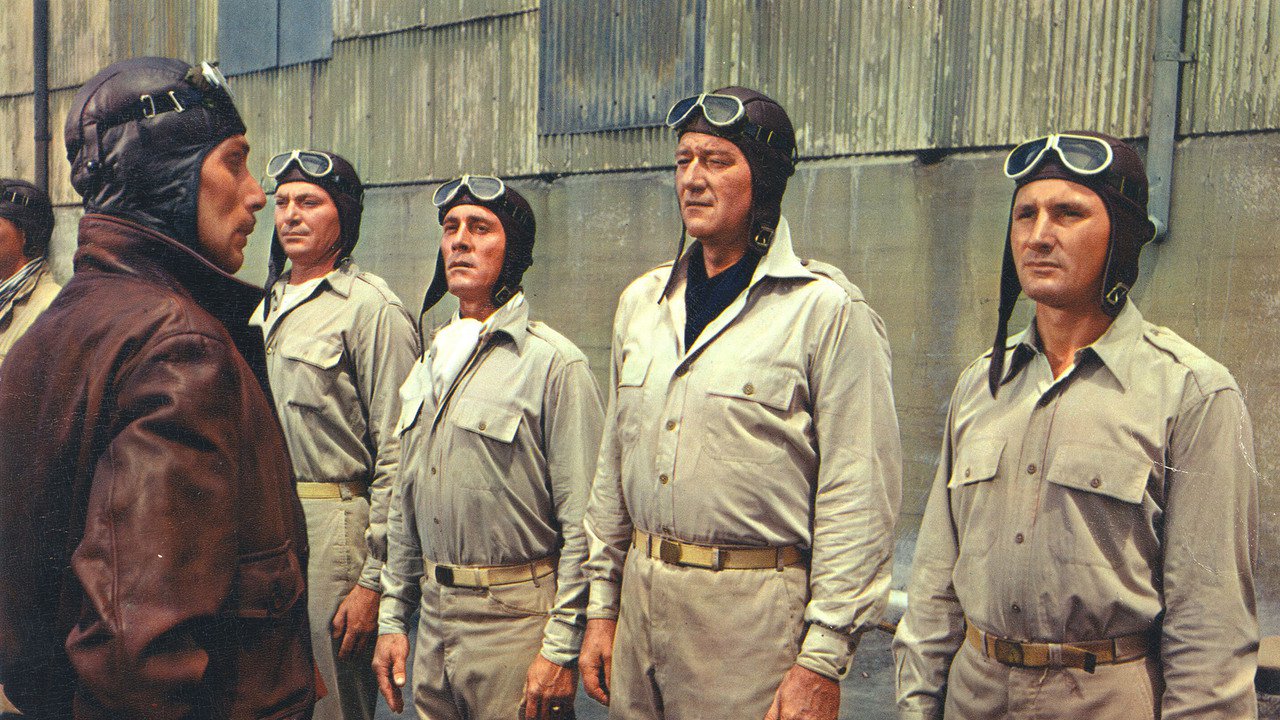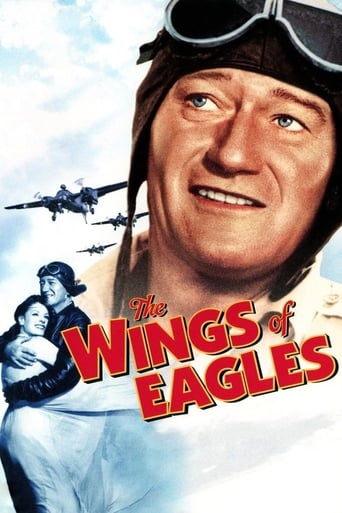

This is a small, humorous movie in some ways, but it has a huge heart. What a nice experience.
... View MoreOne of the worst ways to make a cult movie is to set out to make a cult movie.
... View MoreThe story, direction, characters, and writing/dialogue is akin to taking a tranquilizer shot to the neck, but everything else was so well done.
... View MoreI enjoyed watching this film and would recommend other to give it a try , (as I am) but this movie, although enjoyable to watch due to the better than average acting fails to add anything new to its storyline that is all too familiar to these types of movies.
... View More. . . is the main refrain of the theme song for THE WINGS OF EAGLES (repeated 75 or 80 times). This flick supposedly covers 20 years or so of a U.S. Naval Aviator's Real Life. The Fiftyish John Wayne is NOT very convincing portraying this "Spig" character in Spig's Early Twenties. Later, when a totally broken-down Spig hobbles into a movie director's office 10 or 15 years later, the walls are festooned with studio stills of a Young JOHN WAYNE (!) attired in cowboy gear. This may be intended as an "inside joke," but it mostly serves to make viewers wish that they were watching THAT edition of Wayne, as opposed to the boring loser who spends half an hour in the middle of this flick strapped face-down, trying to move one toe. Has Enemy Action put Spig in this predicament? No, he's apparently too drunk to get to his own bathroom in the middle of the night without falling down his own home's stairs. Spig is only shown flying once during THE WINGS OF EAGLES, and he totals the training plane that U.S. taxpayers bought him at the end of a brief joyride. Otherwise, Spig just brawls with Army guys, avoids his wife, and chain-smokes. (His alcoholic spouse has no inkling that Spig's only son is a couple minutes from a death apparently brought on by second-hand smoke!) The final outcome of World War Two will be thrown into doubt (even for History Majors!) when they see that the American Military feels a need to press Spig into service toward the end of THE WINGS OF EAGLES.
... View MoreJohn Ford's willingness to play it up big in his movies was normally one of the director's great strengths. But sometimes it got away from him. A good example is this tribute to his friend "Spig" Wead.Wead (John Wayne) is a U. S. Navy officer chafing to get up in the air. The way he sees it, "How else are we gonna get aviation?" To that end, he takes on the Army, Navy superiors, and even his wife, Min (Maureen O'Hara). His commitment to air power is such that it cancels out everything else, until a sudden accident forces a change of focus."Spig Wead," Min fumes at one point. "Never listen to anybody else. Just do exactly what you wanna do all the time.""The Wings Of Eagles" is one of Ford's stranger movies. Sudden shifts in tone predominate. The film starts out a light-hearted service romp with pratfalls and car chases. Then sudden tragedy occurs. More light-hearted antics follow. Then Ford drops the big boom on Spig. The next half-hour centers on a long, painful convalescence.Ford did mood shifts in his films all the time, of course. Normally, the gears didn't grind so loudly as they do here."Wings Of Eagles" is perhaps best known for Ford's insertion of an autobiographical element, a director named "John Dodge" who enlists Wead as a screenwriter, which Ford actually did after Wead's Navy career came to a sharp end. An argument can be made that Ford is actually presenting us with a double self-portrait: Wead comes off here as difficult, selfish, alcoholic, career-obsessed, and unable to hold onto relationships, all flaws Ford's biographers say the director had in spades. No wonder Ford can't decide whether to play it as comedy or tragedy.Wayne is flat-out brilliant here. Just a year after making "The Searchers" with Ford, the actor was in his peak thespian form and plays the valleys of Wead's life with candid abandon, even shedding his hairpiece this one time on screen. For 15 minutes, he's required to carry major scenes with his face buried in a pillow, and pulls it off. I never got tired of watching him.The same can't be said of the rest of this movie. The mawk runs thick with this one, with O'Hara doing a lot of crying into the camera while Spig flies around the world to prove something or other. Much of the rest of the time is spent on merry fisticuffs with rival Army aviators, or eye-rolling reaction shots from cigar- chewing Dan Dailey as Spig's enlisted buddy Jughead.Spig's virtual abandonment of his family is one of the movie's constant themes. When Min tells one of her daughters about Spig's latest aviation record, the girl replies: "Would it be a record if Daddy came home?"O'Hara has some good scenes, too, and so does Dailey, the latter especially as a prod to Spig's eventual rehabilitation. Both worked well with Ford and knew how to make use of the director's loose reins.Yet Ford for some reason holds off on the happy endings. Normally, this might be a strength, but here it comes off as a bit wanton, especially when the film pushes so many light-comedy buttons. Through the chuckles, Spig suffers and suffers. After a while, so do we.
... View MoreFrank "Spig" Wead's life story, as directed by real-life friend John Ford, starring John Wayne as the hot-shot aviation expert who transforms the U.S. Navy in the 1920s with his piloting prowess, rivaling (but not alienating) the Army in aviation power; later, after suffering a spinal cord injury and a separation from his wife and children, Wead discovers an untapped talent for writing, becoming a successful screenwriter and playwright! Ford bounces jovially from aerial slapstick to human drama to personal tragedy to wartime chaos, and, despite some bumps, keeps this biography lively and colorful. John Wayne and Maureen O'Hara, both of whom toss cigarettes and matches away with abandon, are reassuring as husband and wife, and though O'Hara's initial exit is perplexing, Ford's handling of the narrative doesn't jar us with unresolved feelings. The third act during WWII is just a jumble of patriotic scenes, but Wayne's expression at the finale is surprisingly genuine. He and Ford do Wead's incredible story justice. **1/2 from ****
... View MoreI just caught this on TCM. It's a stretch in acting for Wayne, I think. He rarely did characters with flaws, either physical or mental.But he does a great job.Did anyone catch a wonderful comment made by Wayne while he and the naval staff were watching films of the carriers being bombed? Wayne is commenting that the solution to the Navy's problem is obvious, but it is eluding him. There is some banter about how to get your thinking going when it's at a standstill. That is, how to get into action when things seem unworkable. Wayne comments, "In Hollywood we'd stop and look around and here's the 7th cavalry coming." All things considered, I thought it a great comment!
... View More